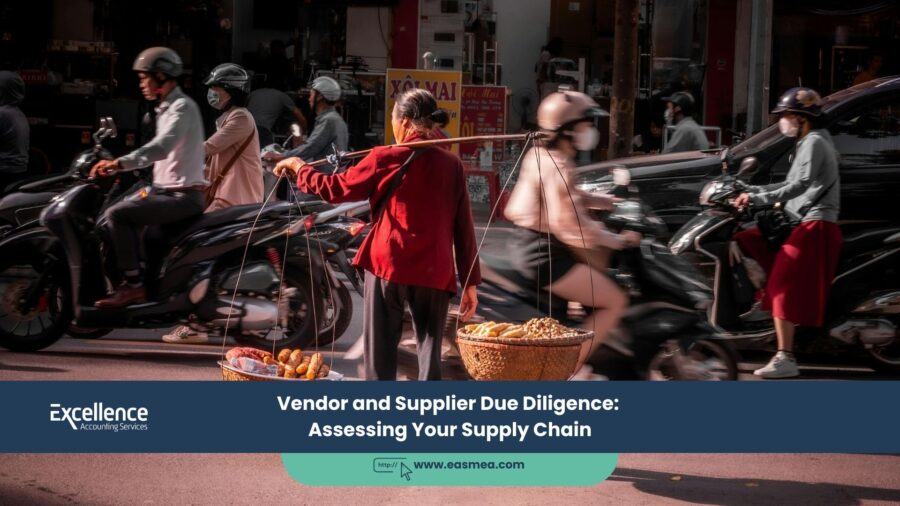Vendor and Supplier Due Diligence: Assessing the Hidden Risks in Your Supply Chain
In today’s interconnected global economy, a company’s strength is inextricably linked to the strength of its supply chain. Your vendors and suppliers are not just external parties; they are extensions of your own business. A failure on their part—whether it’s a financial collapse, a regulatory breach, or a quality control disaster—can have immediate and severe consequences for your operations, reputation, and bottom line. Simply choosing a supplier based on the lowest price is a dangerously outdated strategy.
- Vendor and Supplier Due Diligence: Assessing the Hidden Risks in Your Supply Chain
- Beyond Price and Quality: The Hidden Risks in Your Supply Chain
- The Core Components of Vendor Due Diligence
- Strengthening Your Supply Chain with Excellence Accounting Services (EAS)
- Frequently Asked Questions (FAQs)
- Are There Hidden Risks in Your Supply Chain?
This is where **Vendor and Supplier Due Diligence** becomes a critical business function. It is a proactive and systematic process of investigating a potential or existing supplier to assess their capabilities, stability, and integrity. It’s about looking beyond the sales pitch and the price list to understand the full spectrum of risks associated with bringing that partner into your ecosystem. For businesses in the UAE, a hub of global trade, this process is essential for building a resilient and reliable supply chain.
This guide will explore the crucial components of a robust vendor due diligence process. We will detail the key areas of investigation—from financial health to ethical standing—and explain why this is not a one-time check, but an ongoing process of risk management.
Key Takeaways
- Your Supplier’s Risk is Your Risk: A supplier’s financial failure, ethical lapse, or operational breakdown can directly impact your business.
- Due Diligence Goes Beyond Price: It’s a comprehensive assessment of a supplier’s financial stability, operational capability, legal compliance, and reputation.
- Mitigates Multiple Threats: A proper due diligence process helps mitigate financial risk (supplier bankruptcy), operational risk (delivery failures), and reputational risk (partnering with unethical firms).
- It’s an Ongoing Process: Due diligence is not just for new vendors. Key suppliers should be re-evaluated periodically to monitor for any changes in their risk profile.
- Documentation is Key: A formal report provides a defensible record of your decision-making process, which is crucial for corporate governance and compliance. A comprehensive due diligence process ensures this.
Beyond Price and Quality: The Hidden Risks in Your Supply Chain
While price, quality, and delivery times are the obvious criteria for selecting a supplier, a strategic due diligence process looks deeper to uncover hidden risks that can lurk beneath the surface.
- Financial Risk: What if your critical supplier is on the verge of bankruptcy? A sudden collapse could halt your production line overnight. Assessing a supplier’s financial health is crucial to ensure their long-term viability.
- Operational Risk: Does the supplier have the actual capacity and quality control processes to meet your standards consistently? A failure here can lead to product defects and delivery delays.
- Reputational Risk: Is your supplier engaged in unethical practices, such as poor labor standards or environmental violations? In today’s transparent world, your brand can be severely damaged by the actions of your partners.
- Compliance Risk: Does the supplier have all the necessary licenses to operate? Are they compliant with UAE laws regarding labor, tax (VAT and Corporate Tax), and industry-specific regulations?
Onboarding a new supplier without due diligence is like hiring a key employee without checking their references. You are exposing your business to unnecessary and potentially catastrophic risk.
The Core Components of Vendor Due Diligence
A structured due diligence process should be a standard part of your procurement and vendor management policy. It should cover four main pillars of investigation.
| Pillar of Investigation | Key Questions to Answer | Methods and Sources |
|---|---|---|
| 1. Financial Stability | Is the supplier financially healthy and stable? Can they weather economic downturns? Do they have a history of paying their own suppliers on time? | Requesting and analyzing their financial statements (audited, if possible), running credit checks, and checking for any public records of financial distress. |
| 2. Legal and Compliance Standing | Is the company legally registered and licensed to operate in the UAE? Are there any pending lawsuits or regulatory actions against them? Are they compliant with tax laws? | Verifying their trade license, checking court records, and confirming their VAT and Corporate Tax registration status. |
| 3. Operational Capability | Do they have the capacity, equipment, and expertise to deliver on their promises? What are their quality control processes? Do they have a robust business continuity plan? | Site visits and facility tours, requests for quality certifications (like ISO), and detailed discussions about their processes and capacity. |
| 4. Reputation and Ethics | What is their reputation in the market? Are they known for being reliable and ethical? Are there any negative media reports or sanctions against the company or its owners? | Checking trade references, conducting media and internet searches, and using specialized compliance databases to screen for sanctions or politically exposed persons (PEPs). |
Strengthening Your Supply Chain with Excellence Accounting Services (EAS)
While vendor due diligence is a broad process, the financial assessment is its core. A supplier’s financial health underpins its ability to operate effectively. EAS provides the expert financial analysis needed to support your vendor due diligence process.
- Financial Due Diligence on Suppliers: As part of our due diligence services, we conduct in-depth analyses of your key suppliers’ financial statements to assess their stability, profitability, and creditworthiness.
- Outsourced CFO Services: We help you develop a formal vendor risk management framework, setting criteria for when and how to conduct due diligence and integrating it into your procurement policies.
- Contractual and Financial Advisory: Our business consultancy team can advise on structuring supplier contracts with financial protections, such as performance bonds or favorable payment terms, based on the findings of the due diligence report.
Frequently Asked Questions (FAQs)
Screening is a basic, initial check (e.g., checking a trade license). Due diligence is a much deeper, more comprehensive investigation, typically reserved for critical, high-value, or high-risk suppliers.
For your most critical suppliers, a periodic re-evaluation (e.g., annually or every two years) is a best practice. This helps you monitor for any changes in their financial health or compliance status.
No. While the depth of the due diligence should be proportional to the risk, even small businesses should perform basic checks on their key suppliers. A small business can be crippled if its single most important supplier fails.
A refusal to provide basic information, such as financial statements (under an NDA) or trade references, is a significant red flag. It suggests a lack of transparency or that the supplier has something to hide.
You can request their financial statements as a condition of doing business. You can also run credit reports through local credit bureaus, check for any court cases related to non-payment, and rely heavily on trade references from their other customers and suppliers.
If your supplier is a “Related Party” or “Connected Person” under the CT law, your transactions with them must be at “arm’s length” (market price). The due diligence process, which assesses their capabilities and market position, provides important context for justifying your transfer pricing.
It’s typically a cross-functional effort. The procurement department often leads the process, with support from finance (for the financial analysis), legal (for compliance checks), and the relevant operational department (for the technical assessment).
This doesn’t automatically mean you should drop them. The due diligence finding allows you to manage the risk. You might negotiate different payment terms (e.g., paying on delivery instead of upfront), seek a performance bond, or begin proactively identifying an alternative supplier as a backup.
Yes. There are software platforms that can automate the screening process, such as checking against international sanctions lists and monitoring for adverse media mentions. However, the deeper financial and operational analysis still requires expert human judgment.
By making due diligence a standard practice, you systematically weed out unstable or unreliable suppliers. This creates a more resilient, transparent, and high-performing supply chain, which becomes a significant competitive advantage for your business.
Conclusion: Your Business is Only as Strong as Your Supply Chain
In a world of increasing complexity and uncertainty, a resilient supply chain is not a luxury; it is a necessity. Vendor and supplier due diligence is the cornerstone of building that resilience. By moving beyond a simple focus on price and embracing a holistic view of supplier risk, you can protect your business from disruption, safeguard your reputation, and build partnerships that truly support your long-term growth and success.
Are There Hidden Risks in Your Supply Chain?
Contact Excellence Accounting Services to learn how our financial due diligence expertise can strengthen your vendor assessment process.




